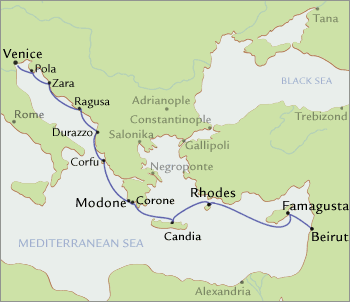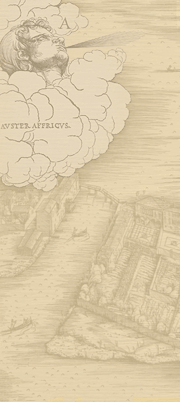Journey Map: Non-Flash Version

Galleys of Beirut
Four or five galleys left Venice for Beirut in late August or early September each year. They were expected back in November after a voyage of three months. The fleet stopped at Candia, Rhodes, and Famagusta on the journey out and back.
Points of Interest
Modone - Modone (ancient and modern Methone) was one of Venice's most important naval bases, guarding the entrance to the Adriatic. Almost all Venetian galleys called at Modone en route to their destination and again on their return to Venice.
In 1403, Michael witnessed the carnage of a sea battle fought against the Genoese by the Venetian fleet near Modone.
Michael likely visited Modone on almost every voyage he made to the east, and almost every time he served in the Guard.
Rhodes - In 1309, after Western Crusaders were ejected from the Holy Land, the Knights of the Hospital took control of Rhodes. The Knights used the island as headquarters and as a base for attacks on Muslims in Asia Minor. The island fell to the Ottoman Turks in 1522.
Probably born in Rhodes around 1385, Michael is known to have visited it twice, in 1423 when he was on a merchant fleet to Alexandria, and again in 1440, when he traveled to Beirut after escorting the Byzantine emperor to Constantinople.
Famagusta - This city was the nominal capital of the Kingdom of Cyprus. Although the island was ruled by Kings Janus and John II during Michael's lifetime, Famagusta was in fact controlled by the Genoese.
Michael visited Cyprus at least three times: as comito in 1433; as armiraio in 1440; and as homo de conseio in 1442. On the 1440 voyage, Michael commanded the movements of the fleet that brought Medee Paleologo of Montferrat to Cyprus to marry King John II.
Beirut - Founded by the Phoenicians, Beirut had one of the best harbors in the eastern Mediterranean. The sultan of Egypt controlled it during Michael's lifetime.
Beirut sat at the end of a long caravan route across Mesopotamia to Persia and Central Asia. Goods traded for here included cotton, silk, drugs, and spices.
Michael voyaged to Beirut in 1440 as armiraio after taking part in a diplomatic mission to Cyprus.











